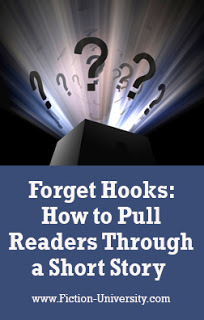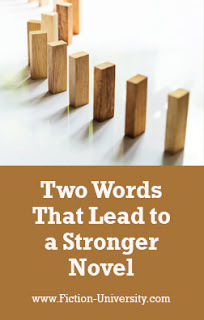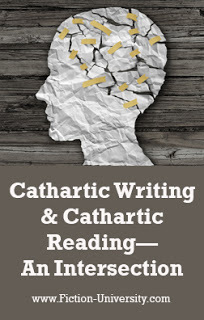Janice Hardy's Blog, page 26
March 27, 2021
WIP Diagnostic: Is This Working? A Closer Look at a Romantic Suspense Opening Page
 Critique by Janice Hardy, @Janice_Hardy
Critique by Janice Hardy, @Janice_Hardy WIP Diagnostics is a weekly column that studies a snippet of a work in progress for specific issues. Readers are encouraged to send in work with questions, and we diagnose it on the site. It’s part critique, part example, and designed to help the submitter as well as anyone else having a similar problem.
If you're interested in submitting to WIP Diagnostics, please check out these guidelines.
Submissions currently in the queue: One
Please Note: As of today, critique slots are booked through April 3.
This week’s questions:
1. Is there enough conflict to wonder what happens next?
2. Is there enough at stake and is it personal to make the reader care? If not, any suggestions?
3. Is the opening all showing or is telling detected?
4. Is the scene grounded enough in description?
5. Is there enough about Malia to make the reader care or sympathize with her?
Market/Genre: Romantic Suspense
On to the diagnosis…
Continue ReadingWritten by Janice Hardy. Fiction-University.com
Published on March 27, 2021 05:20
March 25, 2021
Keep Moving: Describe Your Setting on the Go
[image error]By Ann Harth, @Annharth
Part of the How They Do It Series
JH: Finding the right balance between a fleshed-out setting and an under (or over) developed one can be tricky. Ann Harth shares a three-step plan for describing a setting that's just right.
Ann Harth writes fiction and non-fiction for children and adults. Strong, interesting female characters creep into many of her books, and many arrive with a sense of humor.
She taught writing for the Australian College of Journalism for eight years before taking the leap into freelance writing and structural editing work.
Ann is the Far North Queensland coordinator for The Society of Children’s Book Writers and Illustrators. She’s had a number of fiction and non-fiction children’s books published in Australia and the UK and over 130 short stories sold internationally.
When not tapping the keys, Ann stuffs a notebook into her pack and searches for remote places to camp, hike or explore.
Website | Goodreads | Facebook | Twitter |
Take it away Ann...
Continue ReadingWritten by Janice Hardy. Fiction-University.com
Part of the How They Do It Series
JH: Finding the right balance between a fleshed-out setting and an under (or over) developed one can be tricky. Ann Harth shares a three-step plan for describing a setting that's just right.
Ann Harth writes fiction and non-fiction for children and adults. Strong, interesting female characters creep into many of her books, and many arrive with a sense of humor.
She taught writing for the Australian College of Journalism for eight years before taking the leap into freelance writing and structural editing work.
Ann is the Far North Queensland coordinator for The Society of Children’s Book Writers and Illustrators. She’s had a number of fiction and non-fiction children’s books published in Australia and the UK and over 130 short stories sold internationally.
When not tapping the keys, Ann stuffs a notebook into her pack and searches for remote places to camp, hike or explore.
Website | Goodreads | Facebook | Twitter |
Take it away Ann...
Continue ReadingWritten by Janice Hardy. Fiction-University.com
Published on March 25, 2021 04:26
March 24, 2021
How to Show (and not Tell) Without Raising Your Word Count
 By Janice Hardy, @Janice_Hardy
By Janice Hardy, @Janice_Hardy Your word count has nothing to do with how well your novel is written, but it can be a red flag that there’s a problem.
I got several interesting questions on last week’s article about how point of view strengthens a novel that deserved further exploration. Essentially, commenters were concerned that showing would bloat their manuscripts and add too many words. They were particularly worried about already large manuscripts.
This is a legitimate concern for a lot of writers, because showing can use more words than telling. But it also allows you to cut words from other areas, because when you show you also:
CharacterizeDramatizeDescribeWhen you show, you allow characters to interact with the world, which sneaks in details while you show action and internalization. The details you use convey more than one thing, which saves you words in the long run.
Continue ReadingWritten by Janice Hardy. Fiction-University.com
Published on March 24, 2021 03:00
March 23, 2021
Forget Hooks: How to Pull Readers Through a Short Story by Making Promises and Raising Questions
 By José Pablo Iriarte, @LabyrinthRat
By José Pablo Iriarte, @LabyrinthRatPart of the Focus on Short Fiction Series
JH: Keeping readers engaged in a story is no easy task. José Pablo Iriarte shares tips on how to keep readers wanting more.
I'm going to talk about story openings in this post, but this isn't a post about story openings. Rather, it's about grabbing the reader's interest and sustaining that interest throughout an entire story. That's important to authors working at all lengths, of course, but I think writing short stories comes with its own special challenges when it comes to reader interest.
You would think that short story authors would have it easier when it comes to pulling the reader through a story. What is a short story but the perfect prose morsel for the short attention span age? But on the other hand, we don't just want readers to finish our stories. We want our stories to be memorable. We want them to lead to something . . . the reader seeking out our other works, or reprint sales, or award consideration. With a novel, you've got tens of thousands of words with which to make an impression, to win the reader over or wear down their barriers.
Continue ReadingWritten by Janice Hardy. Fiction-University.com
Published on March 23, 2021 03:10
March 22, 2021
Two Words That Lead to a Stronger Novel
 By Janice Hardy, @Janice_Hardy
By Janice Hardy, @Janice_Hardy There’s a fine line between a series of things that happen and a plot.
Seeing exactly how a novel unfolds in your head is both a blessing and a curse. It’s helpful to know how the story plays out, but it’s also easy to get scope-locked on what you know happens that you forget to include the why or how of it. The protagonist’s actions might make sense on a first glance, but when you ask questions or poke at the plot even a little, it falls apart.
Things happen because they need to happen for the plot to work, not because the characters made them happen. There’s no cause and effect. There’s just effect.
Basically, characters are following instructions, they’re not living their lives and dealing with issues.
Continue ReadingWritten by Janice Hardy. Fiction-University.com
Published on March 22, 2021 03:00
March 20, 2021
WIP Diagnostic: Is This Working? A Closer Look at a Paranormal Romance Opening Page
 Critique by Maria D'Marco
Critique by Maria D'Marco WIP Diagnostics is a weekly column that studies a snippet of a work in progress for specific issues. Readers are encouraged to send in work with questions, and we diagnose it on the site. It’s part critique, part example, and designed to help the submitter as well as anyone else having a similar problem.
If you're interested in submitting to WIP Diagnostics, please check out these guidelines.
Submissions currently in the queue: One
Please Note: As of today, critique slots are booked until March 27.
This week’s questions:
1. Does this opening grab you and compel you to read on?
2. Are there confusing details you needed explained right away? Too many details/backstory?
3. Is my MC’s voice distinctive? Interesting? Do you connect with her and sympathize?
Market/Genre: Paranormal Romance
On to the diagnosis…
Continue ReadingWritten by Janice Hardy. Fiction-University.com
Published on March 20, 2021 04:28
March 19, 2021
Story Structure: How The Act Three Plan Works in a Novel
 By Janice Hardy, @Janice_Hardy
By Janice Hardy, @Janice_Hardy The act three plan kicks off the end of the novel and promises readers an ending to remember.
The act three plan is one of those moments that make it easy to tell if your ending is going to work or not. If this plan is strong (even if it won’t work), and clear about what has to be done, odds are the ending and climax will be equally strong and clear. If this is fuzzy, odds are you’re going to struggle with your ending.
This isn’t an absolute, of course, just something I’ve noticed over the years. This is the moment where the protagonist decides what to do to resolve the conflict of the novel and puts a plan into action. If you aren’t sure what that plan is or what has to be done to resolve the conflict, that’s a big red flag that you aren’t clear about what your ending is. It could also suggest you aren’t sure what the core conflict of the novel is.
“I don’t know how to end it” is a common issue with novels that don’t have a clear problem to solve, and the author doesn’t know what it’s truly about. Once they figure this out, they figure out how to end the novel.
Continue ReadingWritten by Janice Hardy. Fiction-University.com
Published on March 19, 2021 05:13
March 18, 2021
Cathartic Writing & Cathartic Reading—An Intersection
 By Bonnie Randall
By Bonnie RandallPart of The Writer's Life Series
JH: Stories do more than simply entertain or inform us. Bonnie Randall shares why reading is critical to good health, and why writers should write the tough stories.
‘Catharsis’—a word derived from the Greek Katharos; to purify, and Katharein; to cleanse. To experience catharsis is to know a sense of ‘renewal upon release’, and much material has been compiled on cathartic writing: there are analysis out there on everything from personal journaling to the Taylor Swift lyrics that appear to process the artist’s angsty relationships.
Less, though, has been written about the concept of cathartic reading, yet perhaps at no time quite like the unusual era we are living in now do the benefits of cathartic reading seem more profound.
Following is a compilation of reasons why the fiction and memoirs you—yes: YOU—are crafting right now are so incredibly valuable for the population you’re reaching out to.
Continue ReadingWritten by Janice Hardy. Fiction-University.com
Published on March 18, 2021 03:00
March 17, 2021
Is This Right? A Commonly Misused Words Quiz
 By Janice Hardy, @Janice_Hardy
By Janice Hardy, @Janice_Hardy Take this quick quiz to see if you know how to use these five commonly misused words.
Being a writer is all about using the right word for the job, but there are some words that trip up just about everyone. Words such as farther or further, lay or lie, and the always troublesome affect or effect. I can’t tell you how often I’ve puzzled over that last one, since it’s particularly tricky.
It doesn't help that these words are frequently used incorrectly in the real world, either. We get so used to seeing the wrong usage that we don't even noticed it when we goof up.
Take this quiz and see how well you know your commonly misused words:
Continue ReadingWritten by Janice Hardy. Fiction-University.com
Published on March 17, 2021 03:00
March 16, 2021
How to Publish Your Own Short Story Collection
 By Rayne Hall, @RayneHall
By Rayne Hall, @RayneHallPart of the Focus on Short Fiction Series
JH: If you have a lot of short stories written, publishing a collection might be a great idea. Rayne Hall shares tips on how to publish a successful short story collection.
Do you want to gather your short stories in a book? Here are insider tips for publishing a successful short story collection. Whether you’re looking for an agent or publisher, or plan to self-publish, these tips will put you ahead of the game.
1. Stick to one genre
Short story collections sell best if they focus on one genre, for example, romance, fantasy, historical or horror. Collections within a sub-genre are even more popular, e.g. paranormal romance, urban fantasy, mediaeval historical or psychological horror.
Continue ReadingWritten by Janice Hardy. Fiction-University.com
Published on March 16, 2021 03:55



